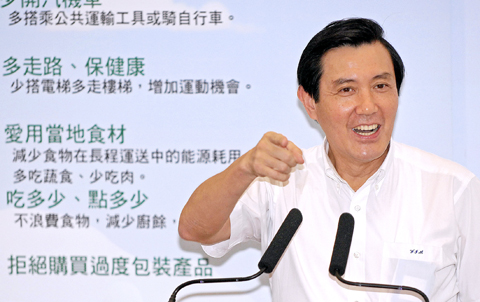On World Environment Day yesterday, nuclear power was listed as an option for the government’s carbon-free energy program as the Cabinet approved sustainable energy policy guidelines.
The move indicated that the new Chinese Nationalist Party (KMT) administration will run counter to the statutory goal of establishing a “nuclear-free homeland,” which the former Democratic Progressive Party (DPP) government pushed through in the Environment Basic Law (環境基本法) in 2002.
Yeh Huey-ching (葉惠青), the director-general of the Ministry of Economic Affairs’ (MOEA) Bureau of Energy, which drew up the draft guidelines, sidestepped that question, saying that “problems related to nuclear power require further deliberation.”

PHOTO: SAM YEH, AFP
Asked about the government’s position on the nation’s three nuclear power plants and the new Fourth Nuclear Power Plant, Yeh said: “We intend to use every means available to reduce carbon emissions. [Nuclear] is the last option to be considered, the last choice.”
Premier Liu Chao-shiuan (劉兆玄) issued a directive at yesterday’s Cabinet meeting to speed up the completion of the Fourth Nuclear Power Plant, to find the best solution to handle nuclear waste and to better communicate with the public about the nuclear power issue, Yeh said.
Yeh said that the percentage of the nation’s electricity derived from nuclear power would not be determined until a planned national energy conference in the latter half of the year.
Currently nuclear power generates 17 percent of Taiwan’s electricity.
Taiwan was the first country in Asia to announce a plan to build a “nuclear-free homeland” when it introduced the law in 2002, a joint decision by the KMT and DPP that sought to end the political standoff that arose from the DPP’s decision in 2000 to halt the construction of the Fourth Nuclear Power Plant.
The plant is scheduled to go on-line late next year.
Based on the law, the former DPP government established a Nuclear-Free Homeland Promotion Commission to publicize the policy and had the MOEA draw up a statute to bring forward the phasing out of the three existing nuclear power plants.
Under its sustainable energy policy guidelines, the KMT administration has vowed to pursue energy efficiency, clean energy and energy stability to create a “win-win-win” situation for energy production, the environment and economic growth.
In terms of energy efficiency, energy intensity — a measure of energy consumption per GDP — should be cut by 20 percent below 2005’s levels by 2015 and further lowered to 50 percent below those levels by 2025, the guidelines said.
The government would be required to increase the percentage of electricity generated by low-carbon fuel to 55 percent of the nation’s requirements by 2025 from the current level of 40 percent and the energy generated by renewable carbon-free sources from the current level of 5 percent to 8 percent by 2025.
“These are all demanding objectives,” Yeh said.
Yeh said that the government would push for the passage of regulations that aim to reduce carbon dioxide emissions, encourage renewable energy production and impose an energy tax.

A preclearance service to facilitate entry for people traveling to select airports in Japan would be available from Thursday next week to Feb. 25 at Taiwan Taoyuan International Airport, Taoyuan International Airport Corp (TIAC) said on Tuesday. The service was first made available to Taiwanese travelers throughout the winter vacation of 2024 and during the Lunar New Year holiday. In addition to flights to the Japanese cities of Hakodate, Asahikawa, Akita, Sendai, Niigata, Okayama, Takamatsu, Kumamoto and Kagoshima, the service would be available to travelers to Kobe and Oita. The service can be accessed by passengers of 15 flight routes operated by

Chinese spouse and influencer Guan Guan’s (關關) residency permit has been revoked for repeatedly posting pro-China videos that threaten national security, the National Immigration Agency confirmed today. Guan Guan has said many controversial statements in her videos posted to Douyin (抖音), including “the red flag will soon be painted all over Taiwan” and “Taiwan is an inseparable part of China,” and expressing hope for expedited reunification. The agency last year received multiple reports alleging that Guan Guan had advocated for armed reunification. After verifying the reports, the agency last month issued a notice requiring her to appear and explain her actions. Guan

GIVE AND TAKE: Blood demand continues to rise each year, while fewer young donors are available due to the nation’s falling birthrate, a doctor said Blood donors can redeem points earned from donations to obtain limited edition Formosan black bear travel mugs, the Kaohsiung Blood Center said yesterday, as it announced a goal of stocking 20,000 units of blood prior to the Lunar New Year. The last month of the lunar year is National Blood Donation Month, when local centers seek to stockpile blood for use during the Lunar New Year holiday. The blood demand in southern Taiwan — including Tainan and Kaohsiung, as well as Chiayi, Pingtung, Penghu and Taitung counties — is about 2,000 units per day, the center said. The donation campaign aims to boost

The Central Weather Administration (CWA) said a magnitude 4.9 earthquake that struck off the coast of eastern Taiwan yesterday was an independent event and part of a stress-adjustment process. The earthquake occurred at 4:47pm, with its epicenter at sea about 45.4km south of Yilan County Hall at a depth of 5.9km, the CWA said. The quake's intensity, which gauges the actual effects of a temblor, was highest in several townships in Yilan and neighboring Hualien County, where it measured 4 on Taiwan's seven-tier intensity scale, the CWA said. Lin Po-yu (林柏佑), a division chief at the CWA's Seismological Center, told a news conference